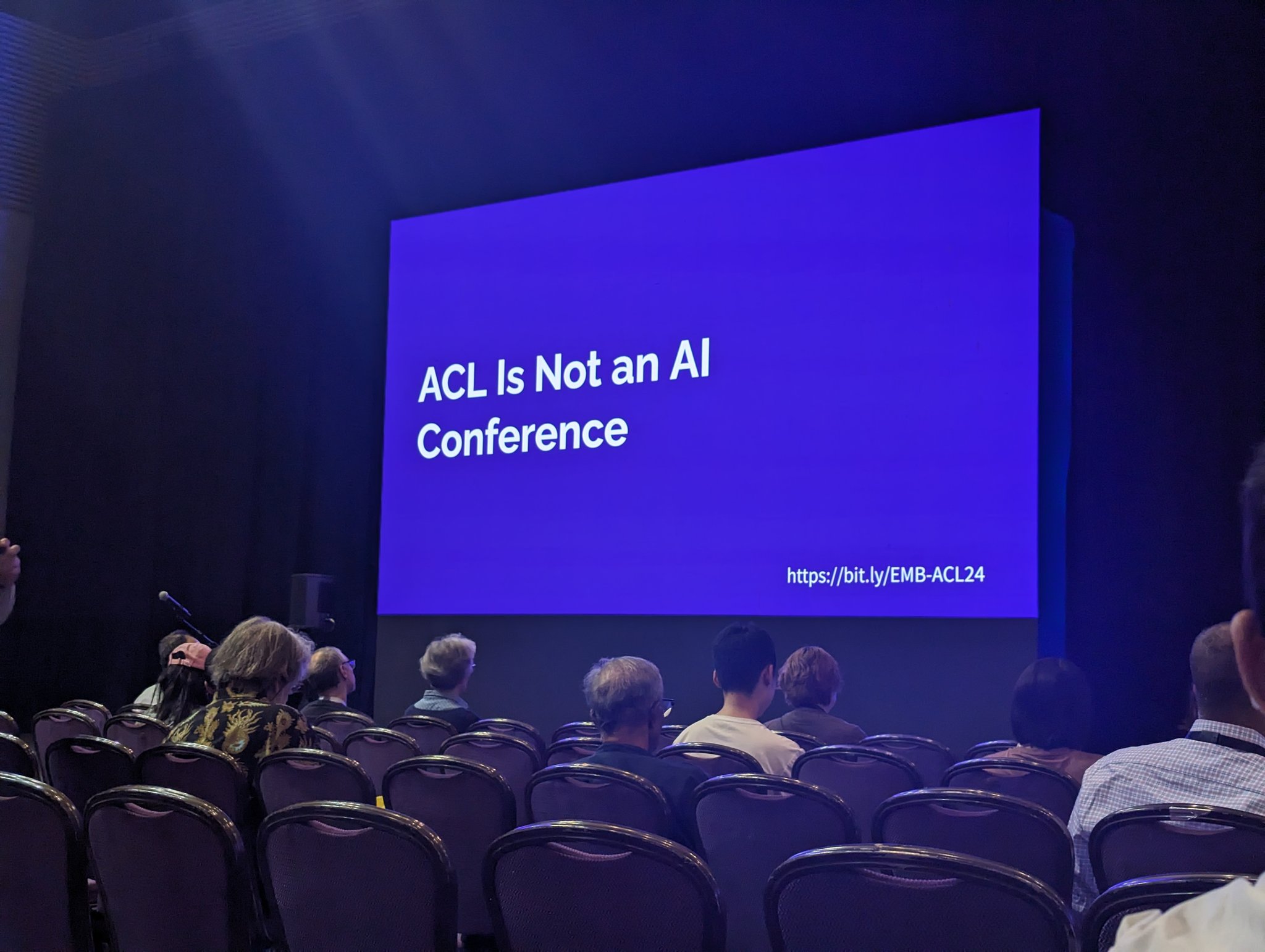Is ACL an AI (or NLP or CL) Conference?

In the title of a controversial Presidential Address at ACL2024, Emily Bender proclaimed that “ACL is not an AI conference.“ I was not fortunate enough to be in Bangkok to hear the address, but I have read the slides and, since it concerns me personally, I want to write a short response.
tl;dr Reinforcing disciplinary boundaries between CL, NLP, and ML makes all three disciplines poorer and less coherent. They all belong at ACL. As for “AI,” it is not a discipline but a marketing term and contrasting it with the big three is a category error.
I am a Computational Linguist who is deeply embedded in the ACL community. I am not alone. People who try to paint ACL as an NLP conference only (e.g., Yoav Goldberg) are ignored the substantial number of CL scientists who participate in ACL in all capacities and the role that CL has always played in the *ACL organizations and conferences. Bender commits the same type of error when she tries to exclude or marginalize “AI,” by which I assume she means machine learning. This is problematic in a couple of respects:
- AI is not a discipline, technology, community, or anything substantial at all—it is a marketing term. One might as coherently say that ACL is not a phlogiston conference as to say that it is not an “AI” conference. AI has referred to symbolic systems like the HPSG grammars for which Bender is well known, expert systems, behavior trees guiding video game characters, classical statistical machine learning, perceptrons, deep neural nets, language models, and so on. AI is just “computers looking smart so you’ll give us money” and not anything a conference could be about.
- If she means “machine learning” then, in a sense, she’s right—almost no one believes that ACL is a machine learning conference in the sense that ICML, ICLR, and NeurIPS are. However, to exclude work from the conference that is focused on ML techniques (which are thoroughly embedded in modern NLP and CL) would make the community vastly poorer. And there is no reason that ACL cannot be a CL conference, and NLP conference, and an ML conference. These fields intersect and reinforce each other and well all benefit from interacting (and even confronting) one another.
I understand one of Bender’s points: many younger reviewers, even in linguistics-heavy tracks like Linguistic Theories and Cognitive Modeling and Phonology, Morphology, and Word Segmentation, will criticize papers for lacking novelty (really technical novelty) when they concentrate on answering a scientific question about language (or a language) rather than presenting a technical innovation. I’ve encountered this when writing metareviews as an AC and AE. I’ve also encountered it first hand. For example, I once received a very low review on a linguistics paper submitted to a *ACL because the ML techniques used were well-known (decision trees, SVMs, and generic LSTMs and CNNs). The reviewer, apparently not familiar with linguistic research, missed our point, which is that these tools resolved a theoretically significant question about the languages under investigation. (Ironically, another reviewer attacked us for ignoring linguistic theory because our findings did not accord with their theoretical preconceptions). In this case, as in many cases I’ve seen, an AC with a broader view of the field(s) stepped in and wrote a balanced and informed metareview. This is not to say that the system is perfect; only that overly strong statements about linguistics being pushed out of ACL by AI-intoxicated reviewers are not helpful.
In fact, there is no reason for linguistics, as a field, to be at odds with ML. The animosity, I think, comes from the incompatibility of a certain kind of linguistics with a particular kind of machine learning researcher. Starting in the 1950s, North American linguistics was dominated by the generative school, which was built upon discrete symbolic representations governed by categorical rules and constraints and arrived at via a specific introspective methodology. This was compatible with (indeed, very much a part) of the first wave of “artificial intelligence” research. Head Driven Phrase Structure Grammar (on which Bender cut her teeth) grows out of this school (though it has a more computationally appealing formalism and a more empirically-oriented culture). But generative linguistics is not (and has never been) the only approached to the language sciences. Many linguists before, during, and after the heyday of generative grammar, have viewed language as grounded in stochastic patterns of usage and for these empirically-minded linguists, machine learning (whether classical or neural) is a natural, intuitive approach to language.
The point of disagreement, really, is in what class of questions are interesting. Few linguists (even computational linguists) are really going be interested in knowledge distillation and few ML practitioners are really going to be interested in noncompositionality in Newari noun phrases. I would like to advance the radical proposition that it is okay for a professional organization and a conference to embrace people who are interested in different things. I would go further and say that we benefit from being in an organization with people who have different interests and backgrounds than we have. In the end, we all have language to tie us together, and we all have computing to tie us together.
I sincerely believe that the name of the ACL should change. We should keep “ACL” but change the full name to “the Association for Computing and Language.” This matched better what the ACL is to me and sets the tenor for a community that embraces a spectrum of research interests and practices.
Enjoy Reading This Article?
Here are some more articles you might like to read next: